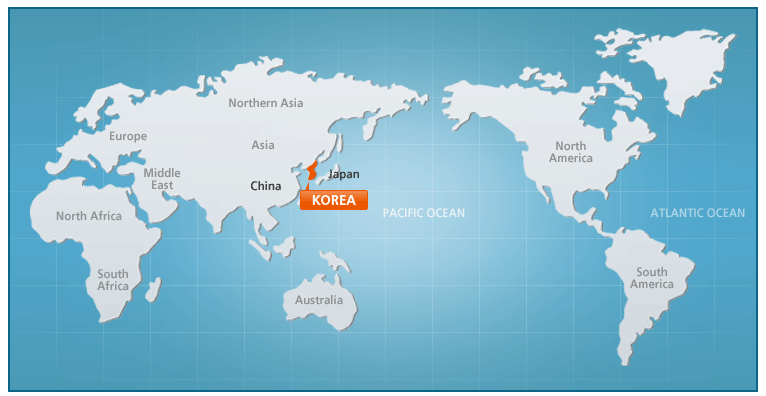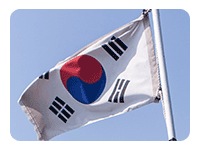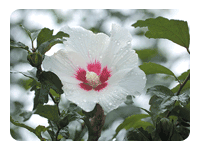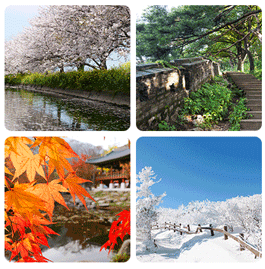Information
The Republic of Korea (herein after Korea) is a country that more than ten million visitors from abroad come to visit every year. With its long history in culture and tradition, the country has a lot to offer to travelers. Please continue reading to learn general information about Korea before visiting.
- Where is Korea?
-

The Korean Peninsula is located in North-East Asia. It is surrounded by the ocean on three sides, making it a unique geographical location. With Seoul as its capital city, the landsite is roughly 1,030 km (612 miles) long and 175 km (105 miles) wide at its narrowest point. Korea's total land area is 100,033 square km, neighboring Japan to the east, China to the west, and sharing a northern border with Democratic People's Republic of Korea (North Korea).
- National Flag: Taegeukgi
-

Its design symbolizes the principles of the yin and yang in Oriental philosophy. The circle in the center is divided into two equal parts, where the upper red responds to the active cosmic forces of the yang; conversely, the lower blue section represents the passive cosmic forces of the yin. The flag's background is white, representing Korean’s desire for peace and purity. The circle is surrounded by four trigrams, one in each corner, characterizing continual movement, balance and harmony. Each trigram symbolizes one of the four universal elements (heaven, earth, fire, and water).
- National Flower: Mugunghwa
-

The national flower of Korea is Mugunghwa, or Rose of Sharon, which comes into bloom from July to October every year. Profusions of the blossom gracefully decorate the entire nation during that time, providing a view which has been loved by all Korean for many years. It is also favorite plant of the people as the flower’s symbolic significance stems from the Korean word ‘Mugung’, meaning immortality. This word accurately reflects the enduring nature of Korean culture, and the determination and perseverance of the Korean people.
- National Anthem: Aegukga
- Aegukga literally means 'a song expressing one’s love towards their country' in Korean, and that was the exact reason this anthem came to be born. Since its creation, the song has undergone several versions of transition; however, it remained focused on praising the sense of loyalty to the country.
- Weather
-
Korea has four seasons, with a wet monsoon/summer season in the middle of the year, and a cold winter from November to March. The island of Jeju off the southern coast is the warmest and wettest place in the country. The ideal time to visit Korea is during the autumn months (September-November). During this time, the country experiences warm, sunny weather, skies that are cobalt blue and spectacular foliage that is perhaps the biggest draw. Winters are cold and dry and are a good time to visit if you are interested in winter sports as there are numerous ski resorts. Spring (April-May) is also beautiful with all the cherry blossoms in bloom. However, it is very busy and one needs to book in advance to ensure accommodation is available. The summer months are muggy and hot, and rather crowded. It is also when the monsoon season begins so many activities are subject to the fluctuations of heavy rain.

Seoul
Originating back more than 5,000 years, Korea is one of the oldest countries in the world, and also one of the most unique. The capital, Seoul, is steeped in a rich history of over 600 years of culture and tradition but is also an exciting futuristic city featuring the latest state-of-the-art technology.
- Culture & History
-
Seoul is a city that embraces the beauty of both tradition and modernity. With five ancient palaces and five World Heritage Sites designated by UNESCO, Seoul is living history of 600 years as the capital of the Choseon Dynasty. You can experience how life was like in the past at hanok villages (traditional Korean houses), learn to make Kimchi and traditional Handicrafts, learn Taekwondo, try making Makgeolli (Korean rice wine), and try a temple stay. Many exciting and unique experiences await you in Seoul.

- Food
-
Seoul’s food does wonders in attracting people to the city. Whatever you have, wherever you are, the food will never fail to satisfy you. From fine dining to casual street food, you will find traditional Korean food, a variety of western cuisine, and fusion cuisine served all throughout the city at restaurants that make you feel like eating at home.

- Shopping & Entertainment
-
Seoul is a shopper’s heaven. The city has numerous shopping malls, department stores, duty free shops, and traditional markets, making shopping available 24/7 all year-round. The streets of Gangnam, Cheongdam, and Shinsadong offer world famous brands and designer shops; Insadong and Namdaemun sell traditional handmade crafts and affordable products; and the COEX Mall, Myeongdong and Dongdaemun areas are among the most popular shopping spots in the city. Seoul also offers a variety of cultural entertainment such as performances, movies, plays, and musicals that run until late in the evening, which is a convenience for travelers who have time constraints. You can enjoy a wide range of performances from traditional Korean ones to non-verbal and dance performances.

- Green & Hi-Tech
-
Seoul is a modern metropolis surrounded by mountains and divided by the Hangang. The city has several parks and trails, and pursues various policies to preserve the environment such as using eco-friendly fuel and vehicles, hosting green international conferences, and operating environment-friendly convention centers. Such policies are also reflected in the city’s administration as it purifies rain water and has water recycling centers and Arisu (brand name of Seoul’s water supply) purification centers. Seoul also boasts a strong foundation for information technology, providing access to the Internet from any location and various applications in people’s daily lives. The city features ubiquitous-based services, digital pavilions, and an exhibition space at Samsung Electronics, offering new and futuristic experiences in high-tech IT.

- Currency & Banking
-
The unit of currency is Korean Won (KRW), expressed as ₩.
₩ denominations are ₩10, ₩50, ₩100 and ₩500.
Bank notes are ₩1,000, ₩5,000, ₩10,000 and ₩50,000.
December, 2020, the exchange rate is approximately ₩1,080 for $1 (USD).
- Currency exchange
- Foreign banknotes can be exchanged at most banks and other authorized moneychangers.
- Banking hours
- 09:00 - 16:00, Monday through Friday
![]()
- Credit Card
-
Visa, and MasterCard are accepted at almost all retail outlets, but Diners Club and American Express may only be accepted at major hotels, shops and restaurants in the larger cities. Check with your credit card company for details on merchant acceptance and other available services.
![]()
- Electricity
-
Outlets for 220 Volts/60Hz are mostly used in Korea. In order to convert the power into 110 volts please contact the hotel housekeeping and current transformer will be available.(Type F or C electrical outlet)
![]()
- Business Hours
-
Government office hours are usually from 9am to 6pm on weekdays and closed on Saturdays and Sundays. Banks are open from 9:00am to 4:00pm on weekdays and closed on Saturdays and Sundays. Major department stores are open every day from 10:30am to 8pm including Sundays.
![]()
- Time Difference
-
Korea is 9 hours ahead of Greenwich Mean Time (GMT +9) and does not observe daylight savings time. http://www.worldtimeserver.com/time_converter.aspx
![]()
- Tip & Tax
-
- Tip
- Tipping is not regularly practiced in Korea. Service charges are often included in the bill for rooms, meals, and other services at hotels and upscale restaurants.
- Tax
- Upon request, visitors can receive VAT refunds of about 10 percent for purchases at "Duty Free Shopping" outlets. Goods must be taken out of Korea within three months of purchase to be eligible for a tax refund. Only foreign tourists in Korea can apply for this tax refund. Visitors can receive refund on receipts with a minimum purchase amount of KRW 50,000 (around US$ 50). To receive VAT refund, present refund eligible receipts together with purchased goods at the customs desk at the airport on your day of departure. The customs desk/Cash Refund Office in front of the Airport Duty Free Shop.
![]()
- Emergency Dial Number
-
- Police : 112 / Fire & Ambulance : 119
- ※ These services are available 24 hours.
![]()
- Useful Website
-
- • Swiss Grand Hotel : http://www.swissgrand.co.kr
- • Incheon International Airport : http://www.airport.kr
- • Gimpo International Airport : http://www.airport.co.kr/gimpo/idex.do
- • About Seoul : http://english.seoul.go.kr
- • About Korea : http://www.tour2korea.com
- • Ministry of Foreign Affairs and Trades http://www.mofat.go.kr
![]()
Visa Information
Before visiting Korea, please check your visa requirements and make sure you have a valid visa. For more information, please contact the local Korean consulate or embassy, or visit the official website of the Korean Ministry of Foreign Affairs and Trade or Korea Immigration Service of the Ministry of Justice.
Countries eligible for Visa-exempt entry
-
(1) Visa Waiver Agreement
The nationals of visa waiver countries can enter Korea without a visa as long as the purpose of their visit is tourism or temporary visit.
-
(2) Designated visa-free entry
The nationals of the following countries are allowed up to 30 - 90 days of visa-free stay for tourism or visitation.
Continent Countries / Regions (days) Asia Macao (90), Brunei (30), Saudi Arabia (30), Oman (30), Japan (90), Qatar (30), Taiwan (90), Hong Kong (90), Kuwait (90), Bahrain (30) [10 countries] Indonesia, Lebanon (for diplomatic and government official passport holders, 30 days, 2 countries) North America United States (90), Canada (6 months) [2 countries] South America Guyana (30), Argentina (30), Ecuador (90), Paraguay (30), Honduras (30) [5 countries] Europe Monaco (30), Vatican (30), Bosnia-Herzegovina (30), Albania (30), Cyprus (30), San Marino (30), Serbia (90), Montenegro (30), Slovenia (90), Andorra (30), Croatia (90) [11 countries] Oceania Guam (30), Nauru (30), New Caledonia (30), Micronesia (30), Samoa (30), Solomon Islands (30), Kiribati (30), Fiji (30), Australia (90), Marshall Islands (30), Palau (30), Tuvalu (30), Tonga (30) [13 countries] Africa South Africa (30), Seychelles (30), Mauritius (30), Swaziland (30), Botswana (30) (5 Countries)
-
Special issues for COVID-19
-
Announcement on Suspension of Visas and Visa-Waiver (April 13, 2020)
Since April 13, 2020, a temporary suspension of visa-waiver or visa-free entry service has been implemented to prevent the further spread of COVID-19.
According to COVID-19 status, any change of regulation for visa or entry to Korea will be updated.
-





